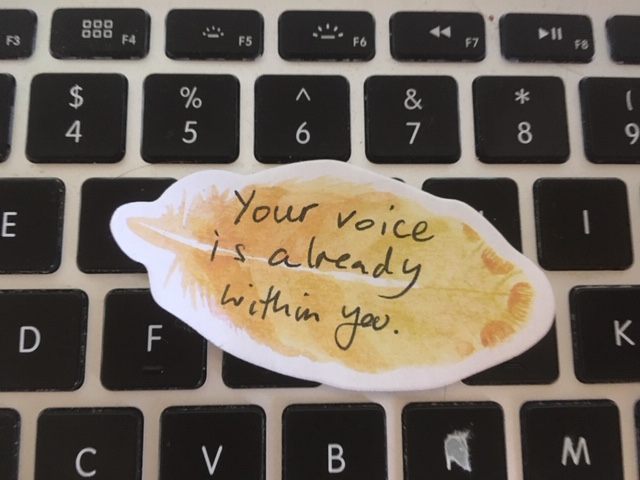Why do we talk about the “voice” of a piece? Because we don’t just read, we hear. As studies show, sound is fundamental to reading. We process words audibly inside our heads, even when we’re reading in silence. That’s why, when we talk about a writing voice, we really do mean the way that voice sounds.
Just like music, your writing voice can move or compel us, without our knowing why. Without a strong voice, we quickly lose interest, feeling lost, rudderless, at sea.
Want your readers to be as absorbed by you as they are by a favorite song? Then here are some tips for developing the powerful voice that is already inside you:
Don’t dress up your sentences. Be “naked” in your expression.
Beginning writers often believe that clever word choice will strengthen their voices, but more often than not, this pushes your reader away. True voice doesn’t seek to impress. It wants only to be authentic, to connect. If you’re used to trying to impress in your writing, just practice being more “naked.” With content, this is especially important, since great content feels powerfully authentic.
In other words, the true voice within is one of your greatest tools.
Jeff Goins says this in such a way that we can also analyze his voice, while we’re at it:
The bottom line is this: Write less, not more. In order to do this, ironically, you will write more than you ever thought you should. And then you will kill your darlings. It’s all part of the process. Slicing down to only the essentials is, after all, how you get to genius. https://goinswriter.com/write-less-not-more-how-to-slice-and-dice/
Now, if Jeff Goins had written the above in the following way, he’d have lost his warm, rhythmic voice. Let’s try to re-write him badly. (I’m sorry, Jeff. We’re doing this to show how you shine!):
For now, I’m going to describe the bottom line to you in this post. Here’s what it is: You need to write far, far less than you might think you actually need to put on the page. I know it sounds silly, but you’ll write really, really massive amounts and then, at the end of the day, you’ll end up telling yourself, “I’m writing so much!” And then, you will just cut those lines upon lines of writing down, so that you’re left with hardly anything at the end of the process.
The difference between these two lies in compression.
Action: Unless they’re essential, cut out your adjectives, be sparing with metaphors, and be as succinct as you can. This will help you to really sound like you. (When Hemingway advised writers to “Kill your darlings,” this is what he meant.) Try to write a whole paragraph directly without dressing up your words, then compress it down, cutting what you can. If you feel exposed by this, notice. That’s just you being yourself on the page. For your readers, your authenticity will shine through.
People will start to hear you.
And that makes all the difference.


